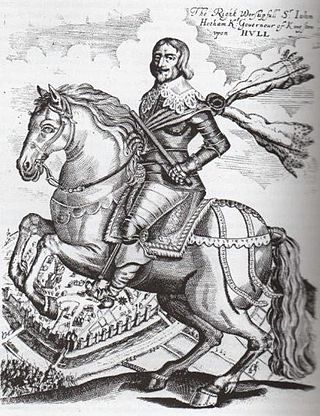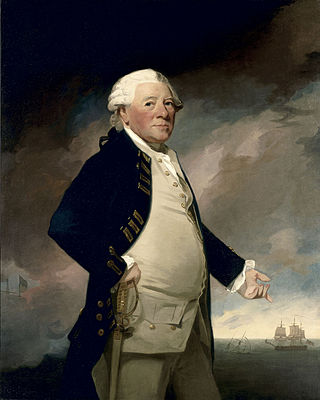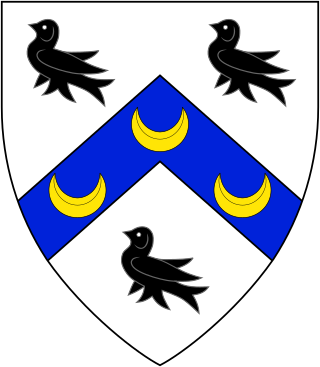Related Research Articles

Earl of Lucan is a title which has been created twice in the Peerage of Ireland for related families.

Earl of Rosse is a title that has been created twice in the Peerage of Ireland, both times for the Parsons family. "Rosse" refers to New Ross in County Wexford.

Earl Howe is a title that has been created twice in British history, for members of the Howe and Curzon-Howe family respectively. The first creation, in the Peerage of Great Britain, was in 1788 for Richard Howe, 4th Viscount Howe, but it became extinct upon his death in 1799. The second creation, in the Peerage of the United Kingdom, was in 1821 for Richard Curzon-Howe, 2nd Viscount Curzon, and it remains extant.
Vice-Admiral of the United Kingdom is an honorary office generally held by a senior Royal Navy admiral. The title holder is the official deputy to the Lord High Admiral, an honorary office which was vested in the Sovereign from 1964 to 2011 and which was subsequently held by the Duke of Edinburgh. Vice-Admirals are appointed by the Sovereign on the nomination of the First Sea Lord.

Admiral Charles Ramsay Arbuthnot was an officer of the British Royal Navy.

Admiral Sir Richard King, 1st Baronet was a British naval officer and colonial governor.

Admiral of the Fleet Sir William Parker, 1st Baronet, GCB, was a Royal Navy officer. As a captain's servant he took part in the Battle of The Glorious First of June in June 1794 during the French Revolutionary Wars and, as a captain, he participated in the capture of the French ships Marengo and Belle Poule at the action of 13 March 1806 during the Napoleonic Wars. He was detached on an independent command on the Tagus in September 1831 with a mission to protect British interests during the Portuguese Civil War. As Commander-in-chief of the East Indies and China Station, he provided naval support at various actions between 1841 and 1842 during the First Opium War. Appointed Commander-in-Chief, Mediterranean Fleet in February 1845, he was briefly First Naval Lord in the First Russell ministry from 13 July 1846 to 24 July 1846 but gave up the role due to ill health before returning to his command with the Mediterranean Fleet.

The Sheriff is the oldest secular office under the Crown. Formerly the Sheriff was the principal law enforcement officer in the county but over the centuries most of the responsibilities associated with the post have been transferred elsewhere or are now defunct, so that its functions are now largely ceremonial.

There have been seven baronetcies created for persons with the surname Parker, three in the Baronetage of England, two in the Baronetage of Great Britain and two in the Baronetage of the United Kingdom. Two of the creations are extant as of 2008. Though none of the different families of baronets were related, several supplied a number of flag officers to the Royal Navy.
The High Sheriff of Hertfordshire was an ancient Sheriff title originating in the time of the Angles, not long after the foundation of the Kingdom of England, which was in existence for around a thousand years. On 1 April 1974, under the provisions of the Local Government Act 1972, the title of Sheriff of Hertfordshire was retitled High Sheriff of Hertfordshire. The High Shrievalties are the oldest secular titles under the Crown in England and Wales, their purpose being to represent the monarch at a local level, historically in the shires.
The high sheriff is the oldest secular office under the Crown and is appointed annually by the Crown. The High Sheriff of Norfolk was originally the principal law enforcement officer in Norfolk and presided at the assizes and other important county meetings. Most of the responsibilities associated with the post have been transferred elsewhere or are now defunct, so that its functions are now largely ceremonial. There was a single high sheriff serving the two counties of Norfolk and Suffolk until 1576.
This is a list of Sheriffs and High Sheriffs of Leicestershire, United Kingdom. The Sheriff is the oldest secular office under the Crown. Formerly the High Sheriff was the principal law enforcement officer in the county but over the centuries most of the responsibilities associated with the post have been transferred elsewhere or are now defunct, so that its functions are now largely ceremonial. Under the provisions of the Local Government Act 1972, on 1 April 1974 the office previously known as Sheriff was retitled High Sheriff. The High Sheriff changes every March.
There have been six baronetcies created for persons with the surname King, one in the Baronetage of Ireland, one in the Baronetage of Great Britain and four in the Baronetage of the United Kingdom. Three of the creations are extant as of 2007.

Admiral Sir Compton Edward Domvile, was a distinguished Royal Navy officer in the Edwardian and Victorian eras.

There have been seven baronetcies created for persons with the surname Watson, one in the Baronetage of England, one in the Baronetage of Great Britain and five in the Baronetage of the United Kingdom. One creation is extant as of 2016.
There have been four baronetcies created for persons with the surname Preston, two in the Baronetage of Nova Scotia, one in the Baronetage of England and another in the Baronetage of the United Kingdom.

The Pigot Baronetcy, of Patshull Hall in the County of Stafford, is a title in the Baronetage of Great Britain. It was created on 5 December 1764 for the politician and colonial administrator George Pigot, with remainder to his brothers General Robert Pigot and Admiral Hugh Pigot, and remains extant. On 19 January 1766 Pigot was further honoured when he was raised to the Peerage of Ireland as Baron Pigot, with normal remainder to the heirs male of his body. Lord Pigot was unmarried and on his death in 1777 the barony became extinct. He was succeeded in the baronetcy according to the special remainder by his brother, Robert, the second Baronet. He was a distinguished soldier.

Admiral Sir Michael Culme-Seymour, 3rd Baronet was a senior Royal Navy officer. On 17 September 1880 he became 3rd Baronet, on the death of his father. The Culme-Seymours were relatives of the Seymour family, his father having added his wife's family name – Culme – to his own following her death.

Admiral Sir George St Vincent King was a Royal Navy officer who went on to be Commander-in-Chief, China Station.
References
- ↑ "No. 13436". The London Gazette . 5 July 1792. p. 511.
- ↑ "No. 25789". The London Gazette . 21 February 1888. p. 1154.